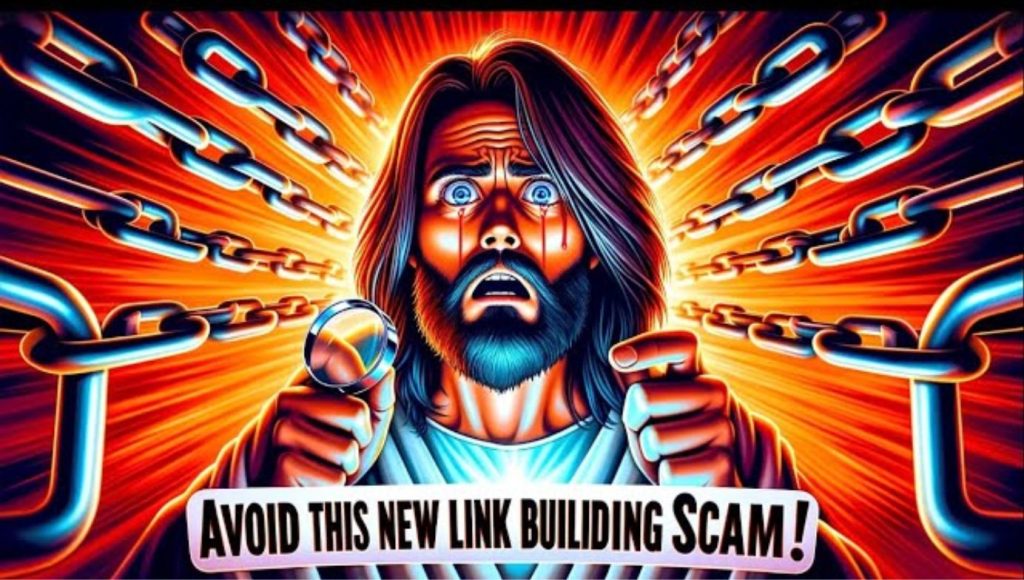Blackhat backlinks and black hat link-building involve unethical techniques to boost a website’s ranking on search engines. Methods include purchasing links or using deceptive schemes to create artificial link networks. Search engines, like Google, penalize sites that are caught using black hat link-building practices, often demoting their rank. Websites caught using black hat tactics can lose both credibility and trust.
Table of Contents
ToggleBlack Hat Backlinks
Search engines are constantly on the lookout for manipulative practices, and websites caught using them can face harsh penalties. In the world of SEO, there’s a clear distinction between quality content and quick tricks. While black hat backlinks might seem like a shortcut to the top, they ultimately damage a website’s ranking and reputation.
________________
Black Hat Link Building Methods
Shady tactics that collectively make up black hat backlinks include:
1. Link Farms
A network of websites designed solely to exchange links with each other in an artificial attempt to boost website rankings. Link farms often have low-quality content and minimal organic traffic.
Search engines like Google penalize websites that participate in link farms. Penalties can range from a decrease in ranking to complete removal from search results.
2. Private Blog Networks (PBNs)
That refers to a network of websites controlled by a single entity, often used to create backlinks to a target website. PBNs typically appear legitimate but are created solely for link building.
Similar to link farms, Google can identify and penalize websites that rely heavily on PBN backlinks.

3. Paid Links
The practice of buying or selling links on other websites. This directly violates Google’s webmaster guidelines. Websites caught buying or selling backlinks can face severe penalties, including complete removal from search results.
4. Cloaking
That’s what happens when a website presents different content to search engines than it does to human visitors.
5. Spamming
Black hat techniques can also involve comment spam, where irrelevant comments containing backlinks are posted on blogs and forums.
PRO TIP: Google allows users to report websites suspected of using spammy tactics. While the exact number of reports isn’t publicly available, the existence of this feature indicates a continuous battle against black hat techniques. So it may be wise to avoid the tactics altogether.
________________
The Bottom Line

Black hat backlinks might seem like a shortcut to SEO success, but they’re a risky gamble. The potential consequences can be devastating and long-lasting. Focusing on creating high-quality content and building backlinks naturally through white hat SEO methods is a more sustainable and ethical approach.
Black hat link builders use all the tactics we mentioned to manipulate search engine rankings. The unethical practices provide a quick boost in rankings, but may also result in severe penalties.
As search engines become smarter, they prioritize websites that offer valuable content to users, rather than those using black hat backlinks. Those links damage a website’s reputation, and worse, they also hinder its long-term growth and visibility.
________________
Why Do People Use Black Hat Backlinks?
Black hat SEO involves using black hat backlinks to boost a website’s rankings on search engine result pages. They’re obtained from low-quality or irrelevant websites, allowing website owners to bypass the time-consuming process of gaining legitimate backlinks.
Using black hat backlinks is a quick way to gain an edge over competitors, but it is against search engine guidelines and will lead to severe penalties if discovered.
In the past, black hat techniques were used without consequence due to primitive algorithms. But, as search engines became more sophisticated, they started to penalize websites that used those tactics.
________________
Risks and Consequences of Violating Search Engine Guidelines with Black Hat Backlinks
Black hat SEO tactics often come with severe risks. Short-term gains might be seen, but long-term repercussions could be disastrous. Here are some reasons why you should avoid Black hat backlinks:
- They violate search engine guidelines: Manipulating search engines is not allowed; breaking the rules will lead to penalties or a ban.
- Credibility and trust drop: When search engines spot Black hat backlinks, they assume manipulation and lower your website’s credibility and trustworthiness.
- User experience worsens: Poor-quality websites with irrelevant content create a bad user experience, driving away visitors.
- Organic traffic drops: Search engines prioritize relevance and quality. Black hat techniques will push your site down the rankings or remove it entirely.
- Brand reputation suffers: Customers may view your business as untrustworthy if associated with shady backlinking practices.
- Legal consequences: You could be subject to legal action from competitors or copyright holders.
Black hat shortcuts may harm your website and the digital ecosystem.
A Backlinko study found that sites with more authoritative backlinks tend to rank better in SERPs, further highlighting the importance of ethical link-building.
________________
How to Identify and Avoid Black Hat Backlinks

To maintain the reputation and visibility of your website, you should identify and avoid black hat SEO techniques, including black hat backlinks. Here’s a 3-step Guide to help you:
- Evaluate the source. Pay close attention to the websites linking to yours. Check if they’re reputable and have relevant content. Avoid spammy-looking or shady sites.
- Analyze anchor text. Look for keyword stuffing or irrelevant phrases in the anchor text of backlinks. Genuine ones usually have natural language.
- Monitor link quality. Use tools like Google Search Console to review your website’s backlink profile regularly. Look out for suspicious patterns or sudden increases in low-quality links, which could be black hat tactics.
Also, stay updated with search engine algorithms to comply with their guidelines and avoid penalties. Quality should take priority over quantity when it comes to backlinks.
To protect your website from the effects of black hat backlinks, monitor and analyze your backlink profile for any signs of suspicious activity. Ignoring the harmful links could cause irreparable damage to your site’s credibility and rankings. Take action now!
________________
The Importance of Whitehat Backlinks
Whitehat backlinks are natural links from trustworthy sources that follow ethical SEO principles. Here are 4 reasons why whitehat backlinks are important:
- Quality Traffic: Whitehat backlinks bring targeted visitors to your website, enhancing its visibility.
- Improved Authority: When trusted sites link to yours, it boosts your credibility and expertise in the industry.
- Growth in Search Rankings: Search engines view whitehat backlinks as an endorsement, leading to higher keyword rankings.
- Long-Term Reliability: Whitehat tactics offer enduring growth without compromising your online rep.
Plus, using natural anchor texts and varied sources for obtaining backlinks boosts the value of the links. It’s important to remember that building whitehat backlinks takes patience and time.
Moz.com found that 99.2% of all sites in the top 10 Google positions have at least one external link to their pages.
________________
White Hat Techniques: Safer Alternatives to Black Hat Links
While black hat tactics might seem tempting, the risks far outweigh the rewards. Here are some safer and more sustainable link-building alternatives:
- Focus on White Hat SEO: White hat SEO focuses on creating valuable content, building a strong online presence, and earning backlinks naturally.
- Guest Blogging: Contribute high-quality articles to relevant websites in your niche. This can generate valuable backlinks organically.
- Broken Link Building: Find broken links on relevant websites and reach out to the owners offering to replace them with your content.
- Social Media Marketing: Promote your content on social media platforms to reach a wider audience and attract backlinks naturally.
- Citations and press releases.
- Combination of some of the above.
________________
Key Takeaways
Exploring black hat backlinks reveals that unethical practices could damage your website’s rep and search engine rankings. Using such tactics is against search engine rules and it jeopardizes your online authenticity on search engine results pages (SERPs).
Black hat backlinks bring quick gains in traffic and visibility. However, the benefit is short-term. Search engine technology now identifies manipulative methods, resulting in penalties such as lowered rankings or being cut from search engine indexes.
PRO TIP: For a lasting and respected online presence, prioritize ethical SEO actions such as top-notch content, engaging with your target audience through honest marketing plans, and gaining real backlinks through worthwhile collaborations.
Prioritizing true SEO services. Follow search engine regulations and build trust with your users. Developing strong ties with your followers cultivates loyalty and natural growth with time.
p.s.
If you have to use blackhat backlinks, be smart about it! And if you are not sure how to be smart, reach out and we’ll share some useful tips to help you not to get deindexed.
Here is a great example of a totally black hat link-building scam that might destroy your digital reputation quickly.
Keep in mind – that this type of black hat backlinks Google identifiers easily.
________________
Frequently Asked Questions
Here are some answers – provided simply – to your burning questions:
Q: What are black bat backlinks?
A: Black hat backlinks refer to unethical or manipulative techniques used to gain links pointing to a website, which can negatively impact the website’s search engine rankings. Those tactics violate search engine guidelines and result in penalties or deindexing of the site.
Q: Why should I avoid black hat backlinks?
A: Using black hat backlinks may lead to severe consequences for your website’s rankings and reputation. Search engines like Google are constantly improving their algorithms to detect and penalize such tactics.
Q: What are some examples of black hat backlinks?
A: Examples of black hat backlinks include paid links, link farms, comment spamming, hidden links, and excessive reciprocal linking.
Q: Are there any benefits to using black hat backlinks to manipulate search engine rankings?
A: While black hat backlinks may yield quick results in the short term, the long-term risks far outweigh any temporary benefits. It is best to focus on building high-quality, organic backlinks for sustainable growth.
Q: How do I identify black hat backlinks?
A: There are various tools available, such as Google Search Console, that help you identify suspicious backlinks. Look for links from unrelated or low-quality websites, excessive anchor text optimization, or a sudden influx of unnatural links.
Q: What should I do if I have unintentionally used black hat backlinks?
A: If you have unintentionally used black hat backlinks, it is necessary to take immediate action. Remove or disavow the spammy or irrelevant links, and focus on building a strong and natural link profile.



